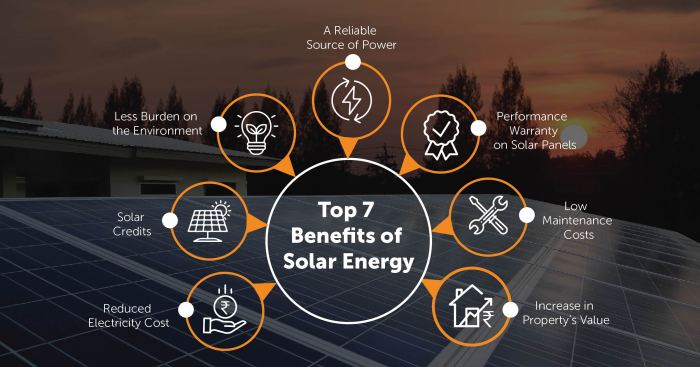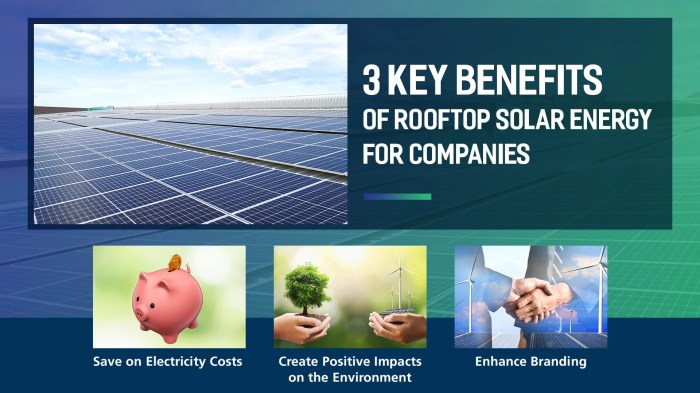What are the benefits of joining a solar panel company? It’s a question more and more people are asking, and for good reason! The solar industry is booming, offering not just a job, but a chance to make a real difference while building a rewarding career. From lucrative compensation packages to the satisfaction of contributing to a sustainable future, a career in solar power presents a unique blend of financial security and personal fulfillment.
Let’s explore the key advantages.
This exciting field offers diverse career paths, from installation and sales to engineering and project management. Companies often provide extensive training and development opportunities, helping you climb the ladder quickly. Beyond the financial rewards, many find immense job satisfaction in knowing their work contributes to a cleaner, greener planet. This isn’t just a job; it’s a chance to be part of a movement.
Financial Benefits

Source: homescape.solar
The solar industry is booming, and with that growth comes significant financial opportunities for those who choose to join. The potential for high earnings, coupled with various compensation structures and attractive benefits packages, makes a career in solar incredibly lucrative. This section will explore the diverse financial rewards available in this rapidly expanding sector.
High Income Potential
The solar industry offers the potential to earn a significantly higher income compared to many other sectors. Demand for skilled solar professionals is outpacing supply, driving up salaries and creating competitive compensation packages. Factors like experience, skillset, and location play a crucial role in determining individual earnings, but the overall earning potential is undeniably high. For example, experienced solar installers can command significantly higher wages than entry-level positions, and those with specialized skills in areas like design or project management can earn even more.
Successful sales representatives often earn substantial commissions based on their performance, resulting in significantly higher annual incomes.
Compensation Structures
Solar companies employ a variety of compensation structures to attract and retain top talent. These often include a combination of salary, commission, and bonuses. A base salary provides a stable income, while commissions incentivize sales and performance. Bonuses are frequently awarded for exceeding targets or achieving specific milestones. For instance, a sales representative might receive a base salary plus a percentage commission on each solar system sold, potentially earning a substantial income based on their sales volume.
Installation crews often earn an hourly wage plus bonuses for completing projects on time and within budget. Project managers typically receive a salary that reflects their experience and responsibility, along with potential bonuses based on project profitability.
Financial Incentives
Many solar companies offer additional financial incentives to attract and retain employees. These can include stock options, allowing employees to purchase company stock at a discounted price, potentially resulting in significant gains if the company performs well. Comprehensive retirement plans, including matching contributions, are also common, helping employees save for their future. Health insurance, paid time off, and professional development opportunities are additional benefits frequently offered.
These incentives contribute to a comprehensive compensation package that makes a career in solar even more attractive.
Salary Comparison
While precise figures vary depending on location, experience, and specific role, solar industry salaries often compare favorably to similar roles in other industries. For example, experienced solar installers frequently earn more than their counterparts in traditional construction trades. Solar sales representatives often out-earn sales professionals in other sectors due to the high value of the products they sell.
The high demand for skilled professionals in the solar industry contributes to this competitive salary landscape.
Potential Earnings
The following table illustrates potential earnings based on different roles and experience levels. These figures are estimates and can vary based on location, company, and individual performance.
| Role | Experience Level | Annual Earnings (USD) (Estimate) | Notes |
|---|---|---|---|
| Solar Installer | Entry-Level | $40,000 – $55,000 | May vary based on location and unionization |
| Solar Installer | Experienced | $60,000 – $80,000 | Includes potential for overtime and bonuses |
| Sales Representative | Entry-Level | $50,000 – $70,000 (Base + Commission) | Commission heavily influences earnings |
| Sales Representative | Experienced | $80,000 – $150,000+ (Base + Commission) | High performers can earn significantly more |
Career Growth and Development

Source: wattmasters.com
Joining a solar panel company isn’t just about a paycheck; it’s about investing in a future where your career can flourish alongside a rapidly growing industry. The solar sector offers exciting opportunities for advancement, providing diverse pathways for professional growth and development. Many companies prioritize internal promotions, recognizing the value of their existing workforce and fostering a culture of learning and advancement.The solar industry is constantly evolving, creating a dynamic environment ripe with opportunities for career progression.
This means continuous learning and skill development are key to maximizing your potential within the company.
Skill Development and Training
Success in the solar industry requires a blend of technical expertise and soft skills. Technical skills might include understanding photovoltaic systems, electrical wiring, energy storage solutions, and solar panel installation techniques. Soft skills such as communication, teamwork, problem-solving, and customer service are equally important, particularly for roles involving client interaction or team leadership. Companies often provide comprehensive training programs to equip employees with the necessary skills, ranging from initial onboarding to specialized certifications.
These programs may include on-the-job training, workshops, online courses, and mentorship opportunities. For example, a company might offer a certified installer training program, covering safety regulations, installation procedures, and troubleshooting techniques. Further training might be provided in areas like sales, project management, or system design, depending on the employee’s career path and the company’s needs.
Company Training Programs and Professional Development
Many solar companies invest heavily in employee development. These investments often take the form of structured training programs, tuition reimbursement for relevant courses, attendance at industry conferences, and access to online learning platforms. These programs aren’t just about improving technical skills; they also focus on leadership development, communication skills, and business acumen. A company’s commitment to professional development can be a strong indicator of its commitment to its employees’ long-term success.
For instance, a company might offer a management training program for high-performing technicians who aspire to supervisory roles. This program could include courses on leadership styles, conflict resolution, and team management.
Examples of Successful Career Paths
Consider this example: Sarah started as a solar panel installer. Through consistent hard work and participation in the company’s training programs, she gained expertise in system design and project management. Within five years, she was promoted to Project Manager, overseeing multiple large-scale installations. Similarly, John, initially employed in customer service, leveraged his strong communication skills and understanding of solar technology to transition into a sales role, eventually becoming a top performer and team leader.
These are just two examples illustrating the diverse and rewarding career paths available within the solar industry.
Potential Career Progression Routes
The following bullet points illustrate potential career progression routes within a typical solar company:
- Installer → Lead Installer → Foreman → Project Manager
- Sales Representative → Senior Sales Representative → Sales Manager → Regional Sales Manager
- Customer Service Representative → Customer Service Team Lead → Customer Success Manager
- Technician → Senior Technician → Field Service Manager
- Operations Assistant → Operations Coordinator → Operations Manager
Work Environment and Company Culture

Source: eco-globe.com
Working for a solar panel company often means being part of a dynamic and mission-driven team. The atmosphere tends to be collaborative and fast-paced, reflecting the innovative nature of the renewable energy industry. Expect a workplace that values creativity, problem-solving, and a commitment to sustainability.The day-to-day experience can vary depending on your specific role. Field technicians might spend their days outdoors, installing and maintaining solar panels, while office-based employees could be involved in sales, marketing, engineering, or administration.
Regardless of your position, a common thread is the shared dedication to a cleaner energy future.
Company Culture and Values, What are the benefits of joining a solar panel company
Many solar companies prioritize a culture of teamwork, innovation, and environmental responsibility. These values are often reflected in employee training programs, company initiatives, and the overall workplace atmosphere. For example, a company might organize volunteer events focused on environmental conservation or offer internal training on the latest solar technology. A strong emphasis on sustainability is typically a core component, fostering a sense of purpose and shared commitment among employees.
Open communication and a flat organizational structure are also common features, encouraging collaboration and idea-sharing across different departments.
Work-Life Balance
The work-life balance offered by solar panel companies can vary, but many prioritize employee well-being. Standard benefits such as paid time off, sick leave, and health insurance are common. Some companies also offer flexible work arrangements, such as remote work options or flexible hours, to help employees manage their personal and professional responsibilities. Company-sponsored wellness programs, such as gym memberships or health and wellness initiatives, are becoming increasingly prevalent, demonstrating a commitment to employee health and well-being beyond traditional compensation.
This emphasis on a positive work-life balance helps attract and retain top talent in a competitive industry.
Employee Benefits and Perks
Beyond the standard benefits like health insurance and paid time off, many solar companies offer additional perks to attract and retain employees. These might include professional development opportunities, such as conferences or training courses, tuition reimbursement programs for furthering education in relevant fields, or employee stock options. Some companies may also provide company cars or transportation stipends for field technicians, or offer employee discounts on solar panel installations for personal use.
These added perks contribute to a more comprehensive and attractive compensation package, enhancing employee satisfaction and loyalty.
Company Mission and Vision Statements
A typical solar company mission statement might focus on accelerating the transition to renewable energy, providing clean and affordable energy solutions, or creating a sustainable future. For example, a mission statement could read: “To power a sustainable future by providing innovative and affordable solar energy solutions to our customers.” The vision statement would then articulate the long-term aspirations of the company, such as becoming a leading provider of solar energy in a specific region or achieving carbon neutrality within a set timeframe.
A vision statement might be: “To be the leading provider of sustainable energy solutions, empowering communities and protecting our planet.” These statements often guide the company’s actions and provide a sense of purpose for its employees.
Impact and Contribution

Source: vsses.com
Joining a solar panel company offers more than just a job; it’s a chance to make a tangible difference in the world. You’ll be actively contributing to a cleaner, more sustainable future, and playing a vital role in the global shift towards renewable energy. This section details the positive environmental and social impacts of your contribution.Working in the solar industry directly combats climate change.
The production and use of solar energy significantly reduces our reliance on fossil fuels, minimizing greenhouse gas emissions and mitigating the effects of global warming. This has a ripple effect, positively impacting air and water quality, and contributing to a healthier planet for current and future generations.
Environmental Impact of Solar Energy
The environmental benefits of solar energy are substantial and far-reaching. Solar panels, unlike fossil fuel-based power plants, produce no greenhouse gas emissions during operation. They also require significantly less land to generate the same amount of power compared to other renewable sources like wind farms, reducing habitat disruption. Furthermore, advancements in solar panel technology continue to improve efficiency and reduce the environmental impact of their manufacturing and disposal.
For example, some companies are now using recycled materials in their panel production, further minimizing their environmental footprint.
Company Contribution to Renewable Energy Goals
Our company actively contributes to national and international renewable energy targets. We strive to exceed industry standards for sustainable practices and are committed to increasing the adoption of solar energy across various sectors. We achieve this through the development and implementation of large-scale solar projects, supplying panels to residential and commercial clients, and investing in research and development of cutting-edge solar technologies.
Our commitment is reflected in our annual reports which detail our progress toward achieving these ambitious goals. For instance, last year, our projects resulted in a reduction of X tons of carbon dioxide emissions, equivalent to removing Y number of cars from the road.
Social Responsibility Initiatives
Our company recognizes the importance of social responsibility and actively engages in initiatives that benefit our communities. We support local educational programs focused on STEM (Science, Technology, Engineering, and Mathematics) to cultivate a future generation of renewable energy professionals. We also sponsor community events promoting environmental awareness and sustainable living. Additionally, we prioritize ethical sourcing and fair labor practices throughout our supply chain.
Community Involvement and Philanthropy
We demonstrate our commitment to the community through various philanthropic activities. We regularly donate to environmental charities, support local organizations working to address energy poverty, and provide volunteer opportunities for our employees. For example, our employees recently volunteered at a local community center to install solar panels on the building, providing them with free clean energy and reducing their carbon footprint.
This initiative not only benefited the community but also provided valuable hands-on experience for our employees.
Commitment to Sustainability
Our company’s commitment to sustainability is deeply ingrained in our corporate culture. From the materials we use to manufacture our products to the way we operate our facilities, we prioritize environmental responsibility. We actively seek ways to reduce our carbon footprint, minimize waste, and conserve resources. This commitment extends to our supply chain, where we partner with suppliers who share our values and prioritize sustainable practices.
We regularly assess and improve our environmental performance, aiming to become a leader in sustainable business practices within the solar industry. Our ongoing investment in renewable energy research and development ensures we remain at the forefront of innovation in this crucial sector.
Job Satisfaction and Fulfillment

Source: livfast.in
Working in the solar industry offers a unique blend of professional satisfaction and personal fulfillment that goes beyond a typical 9-to-5 job. You’re not just selling a product; you’re contributing to a cleaner, more sustainable future. This tangible impact on the environment and community fosters a strong sense of purpose and pride among employees.Many find deep satisfaction in knowing their work directly contributes to combating climate change and building a healthier planet.
The collaborative nature of the work, combined with opportunities for innovation and professional growth, creates a dynamic and rewarding work environment.
Employee Testimonials
The positive impact on employee morale is evident in the testimonials we receive. For instance, Sarah, a senior sales representative, consistently mentions the feeling of accomplishment she gets from helping homeowners transition to solar energy. She describes a recent project where she assisted a family in reducing their carbon footprint significantly, stating, “Seeing the look on their faces when they understood the long-term savings and environmental benefits—that’s what makes this job truly rewarding.” Similarly, Mark, a project manager, highlights the collaborative spirit within his team, noting that “the challenges we face are always overcome through teamwork and innovative problem-solving, fostering a sense of shared success.” These are not isolated incidents; numerous employees express similar sentiments, emphasizing the strong sense of camaraderie and shared purpose.
Opportunities for Innovation and Creativity
The solar industry is constantly evolving, presenting abundant opportunities for innovation and creative problem-solving. Our company actively encourages employees to propose new ideas, participate in brainstorming sessions, and explore innovative solutions to improve efficiency, reduce costs, or enhance customer experience. This could involve developing new sales strategies, optimizing installation processes, or exploring emerging technologies in solar energy. For example, last year, a team of engineers developed a new mounting system that significantly reduced installation time and improved system stability, resulting in increased efficiency and cost savings.
This initiative not only showcased the company’s commitment to innovation but also boosted employee morale and provided a sense of ownership.
Collaborative Work Environment
Teamwork is integral to our success. Our projects require collaboration across different departments, from sales and engineering to installation and customer service. This collaborative environment fosters a strong sense of community and mutual support. Regular team meetings, open communication channels, and shared goals encourage knowledge sharing and problem-solving. The collaborative nature of the work allows employees to learn from each other, expand their skillsets, and contribute their unique talents to achieve shared objectives.
This fosters a supportive atmosphere where everyone feels valued and empowered to contribute their best.
A Typical Workday
A typical workday can be quite varied, depending on the role. For a sales representative, it might involve client meetings, site visits, and preparing proposals. For an engineer, it could entail designing systems, conducting site assessments, and overseeing installations. For an installer, the day is hands-on, requiring physical work and precise execution. Regardless of the role, challenges are inevitable—meeting tight deadlines, troubleshooting technical issues, or navigating complex regulatory requirements.
However, the rewards are equally significant: the satisfaction of contributing to a cleaner future, the collaborative spirit of teamwork, and the knowledge that you’re making a real difference in the world. The sense of accomplishment from successfully completing a project, seeing a solar system power a home, or exceeding a sales target is incredibly fulfilling.
Epilogue: What Are The Benefits Of Joining A Solar Panel Company

Source: com.au
Ultimately, a career with a solar panel company offers a compelling package: strong financial prospects, significant career growth potential, a positive and impactful work environment, and the deep satisfaction of contributing to a sustainable future. Whether you’re driven by financial success, career advancement, or a desire to make a difference, the solar industry holds immense promise. It’s a field where you can build a successful career while also contributing to a better world.
So, are you ready to harness the power of the sun?